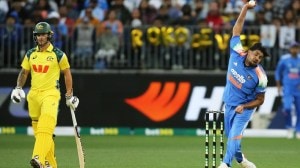Ghauri makes Washington see India’s concerns
WASHINGTON, April 9: The United States is set to ``acknowledge'' India's security concerns in the wake of test-firing of Pakistan's Ghauri m...

WASHINGTON, April 9: The United States is set to “acknowledge” India’s security concerns in the wake of test-firing of Pakistan’s Ghauri missile when a high-powered mission led by Bill Richardson visits the Indian sub-continent next week. Significantly, this will be the first-ever “acknowledgement” by the US that it recognises that India must decide its own nuclear and missile policies taking into account its defence needs not only against Pakistan but also against China, the State Department officials said today.
“We do not dispute the view of the Indian government that their strategic posture has to be based on their own assessment of the region and the rest,” a senior official said when asked whether US acknowledges that India has to take into account not only the perceived threat from Pakistan but also from China, the officials said.
Apart from asking both New Delhi and Islamabad to resume the deadlocked Indo-Pak dialogue, India’s claim to permanent membership of the Security Council and CTBTare among a host other issues which would also come up for discussion during the two-day stay of the delegation in New Delhi on April 14 and 15, the officials said.
The Richardson team, which will also visit Islamabad, Dhaka and Colombo, will urge Prime Minister Atal Behari Vajpayee and his Pakistan counterpart Nawaz Sharif to have the “interrupted Indo-Pak dialogue resumed on all eight points the two nations had agreed for the agenda,” they said.
However, the delegation would tell the two sides that Washington will make no proposal to solve the contentious issues including Kashmir nor offer mediation unless both countries request the US to do so, the officials said.
One of the officials, who explained the American position during a press briefing, said the United States is not seeking quid pro quo on any of its newly “thought-out positions” whether on the nuclear and missile issues or on the Indo-Pak dialogue or on the Indian membership of the Security Council.The positions that will further evolveafter talks with the Indian Foreign Secretary will form the basis of the forthcoming visit of President Bill Clinton to India in six or seven months, they said.
Elaborating the US position on the stalled Indo-Pak dialogue, the officials called for immediate resumption of talks between the two countries.
Sherrod Brown wants US to end pact with China
Democratic Congressman Sherrod Brown today deplored Pakistan’s “provocative” missile test and asked the Clinton administration to end nuclear cooperation with China which may have contributed to the technology that made the Pakistani test possible.
Brown called the Pakistani test of an advanced medium range missile on April 6 “extremely disturbing and unacceptable,” especially in the wake of India’s recent change in government. “I must also point out that this test of new missile technology once again raises grave concerns about the US- China nuclear cooperation agreement. It is quite conceivable that previous defence shipments from Beijing toIslamabad have contributed to this latest breakthrough," he said.





- 01
- 02
- 03
- 04
- 05


























